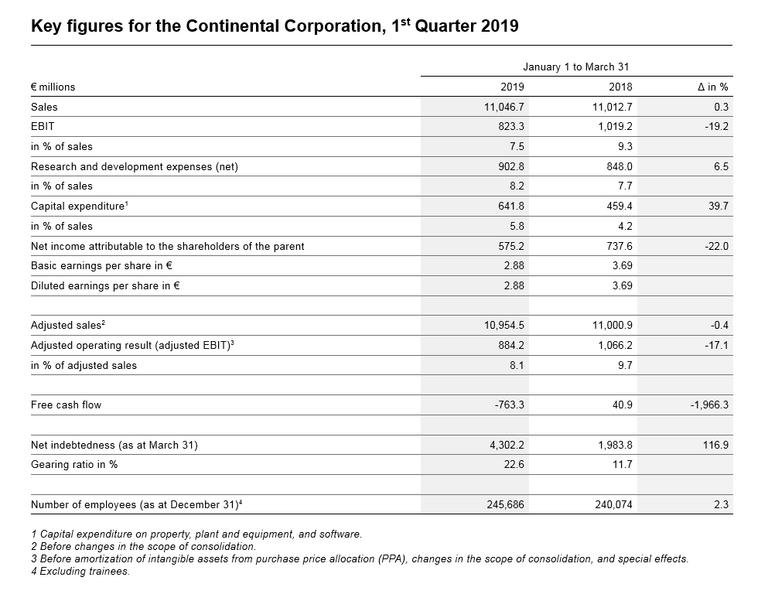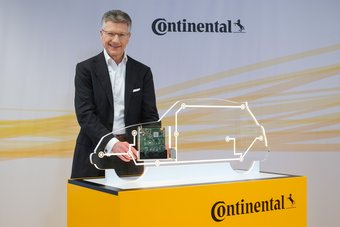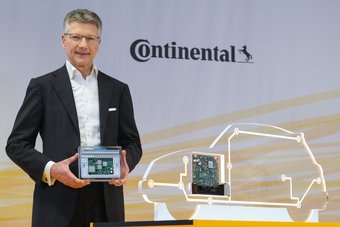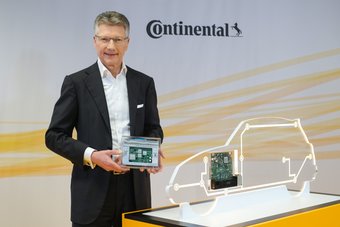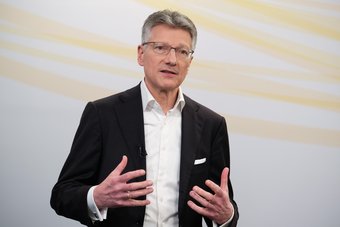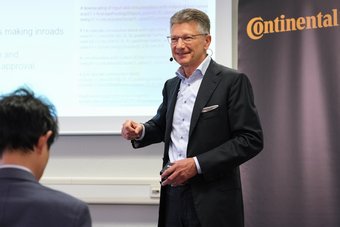Continental Makes a Solid Start to the Business Year
- Market continues downward trend in first three months as expected
- Thanks to strong market position: sales in first quarter on par with prior-year level at €11.0 billion
- Adjusted EBIT at €884 million (margin: 8.1 percent)
- Technology company continues to expect market upturn in second half of the year and thus maintains its annual guidance
- Free cash flow before acquisitions and carve-out effects at minus €579 million
- Gearing ratio increases due to new mandatory accounting standards
Hanover, May 9, 2019. Continental has managed a solid start to the business year. Thanks to its technology portfolio, the company has been able to distance itself from the substantial downward trend on the market. At €11.0 billion, sales were on par with the prior-year level. The adjusted EBIT margin was 8.1 percent (adjusted EBIT: €884 million). “Thanks to our strong market position, we have kept our sales stable in a clearly sluggish market environment. Our stricter cost discipline contributed to our solid results,” said Continental CEO Dr. Elmar Degenhart upon the publication of the quarterly figures in Hanover on Thursday.
In the first three months of 2019, global automobile production was down by more than 6 percent year-on-year, according to preliminary figures. In contrast, the technology company’s organic growth (before changes in the scope of consolidation and exchange-rate effects) was down by only 2 percent. In addition to the company’s strong market position, this was also due to exchange-rate effects which totaled €186 million in the first quarter, attributable primarily to the appreciation of the U.S. dollar in relation to the euro.
As announced at the Annual Shareholders’ Meeting on April 26, Continental continues to expect a market upturn in the second half of the year and is thus maintaining its annual guidance issued at the beginning of January.
The net income attributable to the shareholders of the parent of €575 million was down year-on-year (PY: €738 million). Earnings per share amounted to €2.88 (PY: €3.69).
At €884 million, adjusted EBIT was down 17.1 percent compared with the reporting date for the previous year. This corresponds to an adjusted EBIT margin of 8.1 percent after 9.7 percent in the first quarter of the previous year. “The start to the new fiscal year was challenging, as expected,” remarked Wolfgang Schäfer, Continental’s CFO, adding: “We did, however, already start to heighten our cost discipline last year. We are benefiting from this now.”
In the first quarter, capital expenditure for research and development and for property, plant and equipment, and software came to over €1.5 billion. “Continental is continuing to invest heavily in the mobility of the future, and thus in its future business success,” Schäfer explained.
As at March 31, 2019, Continental’s liquidity reserves totaled €5.7 billion, consisting of cash and cash equivalents of €1.8 billion and committed, unutilized credit lines totaling €3.9 billion.
At the end of the first quarter of 2019, net indebtedness was at €4.3 billion. It was still at around €1.7 billion at the start of the year. The gearing ratio rose from 9.1 percent to 22.6 percent. The reason behind this development is the mandatory application of the IFRS 16 standard since the start of fiscal 2019. Application of the standard resulted in the general recognition of all leases in the statement of financial position and thus a substantial increase in lease liabilities. Capital expenditure on property, plant and equipment, and software increased as a result of this new standard as well.
Free cash flow before acquisitions and carve-out effects totaled minus €579 million in the first three months of 2019. In the same period of the previous year, it amounted to €186 million. Besides the lower sales and results in the first quarter, the decrease was also caused by the necessary investments in capacities and technology development. For the year as a whole, the DAX company confirms that it expects to generate a cash inflow of around €1.4 billion to €1.6 billion before acquisitions and before the effects of transforming its powertrain business into an independent group of legal entities. This assumption is based upon the normal seasonal nature of free cash flow. Cash inflow is usually at its peak at the end of a year, when payments are received in the winter tire business and when automotive manufacturers make reimbursements for development expenses.
Last quarter, sales in the Automotive Group totaled €6.7 billion, a decrease of 1.8 percent. In organic terms – before changes in the scope of consolidation and exchange rate effects – sales were down 4 percent. In contrast, global automobile production in the first three months of 2019 was down by more than 6 percent year-on-year, according to preliminary figures. At €357 million, adjusted EBIT was substantially lower than the previous year’s level, resulting in a margin of 5.4 percent (PY: 8.2 percent) of sales. “In the first quarter, fewer vehicles were produced in all of the world’s major sales markets, in total over 1.5 million fewer passenger cars and light commercial vehicles than in the year before. We cannot escape the effects of such a sluggish market environment,” said Schäfer, commenting on the Automotive Group’s results.
Despite the weak market environment at present, the need for electronics in the car is growing steadily. The best example is advanced driver assistance systems. On average, the car needs about 18 sensors for partially automated driving. In the case of fully automated or autonomous driving, this number increases to 30. In each of the last two years, the technology company received orders totaling €3 billion on average in this area.
In the first three months, the Rubber Group generated sales of about €4.4 billion (PY: €4.2 billion). This represents a 3.8 percent increase in sales. The tire business, and in particular the sales volumes in the commercial-vehicle tires business, experienced a positive trend, with growth of 6 percent. The ContiTech division experienced growth above all in areas that supply to industry, such as the business with conveyor belts and industrial hoses. Organically, i.e. adjusted for changes in the scope of consolidation and exchange rate effects, sales growth in the Rubber Group was 1 percent. In the first quarter, the adjusted operating result came to about €535 million, which corresponds to a margin of 12.4 percent (PY: 12.9 percent).
At the end of the first quarter, Continental’s global workforce comprised a total of 245,686 employees. The company’s need for software developers is especially high. The technology company already employs some 49,000 engineers worldwide, more than a third of whom have a software background. In the company’s own global software academy, more than 2,000 employees will receive further training in 2019 alone. By the end of 2022, the number of software and IT experts is to grow from the current level of 19,000 to 25,000.
Download the PDF version of the Financial Report as at March 31, 2019 - pdf (4.27MB).
Dr. Elmar Degenhart
Dr. Elmar Degenhart, Chairman of the Executive Board Continental AG
Wolfgang Schäfer
Member of the Executive Board, Finance, Controlling, Compliance, Law, and IT, CFO


